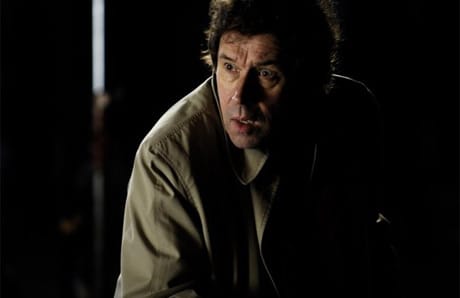This latest effort by Re-Animator director Stuart Gordon has been chided for its thematic obviousness and political confusion. These are valid criticisms, but until the end, its also a refreshingly blunt view of an ugly America you just dont see in movies anymore.
Based on a famous tabloid headline, it details what happens when a nursing home attendant (Mena Suvari) isnt watching the road and ploughs into a homeless man (Stephen Rea). The hapless Rea winds up stuck in the windshield and to the horror of Suvari, refuses to die, so she gets her drug-dealer boyfriend (Russell Hornsby) to help her figure out her murderous options. Meanwhile, the neighbours suspect that something is up but lack the information or the wherewithal to do anything about it.
The moralism is pretty damned obvious ("You can get away with anything! See whos in the White House?), and its take on race and gender is confused enough to be nervous-making. Also, the ending is disappointingly decisive when it ought to be incriminating the audience. But whatever its thematic crimes, its one of the few films to truly expose the morass of avoidance that dominates contemporary discourse.
If it doesnt realise how it feeds into stereotypes (with the black male/white female villain duo being especially eyebrow-raising), it also insists on an America where people dont make big money and live outside of lily-white purity. Even Eli Roth is too stoked on his non-existent cleverness to be this genuinely subversive (or this genuinely anything).
The film is at its best when its not proselytising, which is admittedly not frequent enough, but even at that its a better expression of indie horror critique than anything George A. Romero has done lately.
(Seville)Based on a famous tabloid headline, it details what happens when a nursing home attendant (Mena Suvari) isnt watching the road and ploughs into a homeless man (Stephen Rea). The hapless Rea winds up stuck in the windshield and to the horror of Suvari, refuses to die, so she gets her drug-dealer boyfriend (Russell Hornsby) to help her figure out her murderous options. Meanwhile, the neighbours suspect that something is up but lack the information or the wherewithal to do anything about it.
The moralism is pretty damned obvious ("You can get away with anything! See whos in the White House?), and its take on race and gender is confused enough to be nervous-making. Also, the ending is disappointingly decisive when it ought to be incriminating the audience. But whatever its thematic crimes, its one of the few films to truly expose the morass of avoidance that dominates contemporary discourse.
If it doesnt realise how it feeds into stereotypes (with the black male/white female villain duo being especially eyebrow-raising), it also insists on an America where people dont make big money and live outside of lily-white purity. Even Eli Roth is too stoked on his non-existent cleverness to be this genuinely subversive (or this genuinely anything).
The film is at its best when its not proselytising, which is admittedly not frequent enough, but even at that its a better expression of indie horror critique than anything George A. Romero has done lately.
